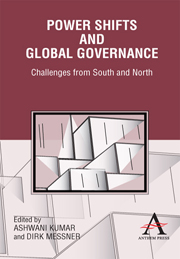Book contents
- Frontmatter
- Contents
- List of Contributors
- Foreword
- Power Shifts and Global Governance
- Part One Theoretical and Analytical Reflections on Global Governance
- 1 Introduction: Global Governance: Issues, Trends and Challenges
- 2 Four Lessons from the Present Global Financial Crisis for the 21st Century: An Essay on Global Transformation from a European Perspective
- 3 Global Civil Society: Emergent Forms of Cosmopolitan Democracy and Justice
- 4 Institutional and Policy Implications of International Public Goods: The Case of Global Commons
- 5 Economic Challenges for Global Governance
- 6 The Rule of Law in Multilateral Institutions and International Aid for Development: Judicial Reform in the Global Order
- Part Two Power Shifts, Regional Experiences and Global Challenges
- Part Three Case Studies in Global Governance
- Notes
3 - Global Civil Society: Emergent Forms of Cosmopolitan Democracy and Justice
from Part One - Theoretical and Analytical Reflections on Global Governance
Published online by Cambridge University Press: 05 March 2012
- Frontmatter
- Contents
- List of Contributors
- Foreword
- Power Shifts and Global Governance
- Part One Theoretical and Analytical Reflections on Global Governance
- 1 Introduction: Global Governance: Issues, Trends and Challenges
- 2 Four Lessons from the Present Global Financial Crisis for the 21st Century: An Essay on Global Transformation from a European Perspective
- 3 Global Civil Society: Emergent Forms of Cosmopolitan Democracy and Justice
- 4 Institutional and Policy Implications of International Public Goods: The Case of Global Commons
- 5 Economic Challenges for Global Governance
- 6 The Rule of Law in Multilateral Institutions and International Aid for Development: Judicial Reform in the Global Order
- Part Two Power Shifts, Regional Experiences and Global Challenges
- Part Three Case Studies in Global Governance
- Notes
Summary
Introduction
In this chapter, I argue for the global civil society as normatively and theoretically a new paradigm of global governance and also a possible emancipatory ‘cosmopolitan political project’ to the emerging challenges of democracy, justice and inclusive governance at the global level. Though global civil society is often perceived as a multilayered, contested and decentred space of associtionalism, I consider it an epic and irreversible ‘double movement’ of people seeking to transform hegemonic structures of global governance, protect human rights, minimize violence and increase the sphere of democratic life across the borderless world. And I suggest that this argument can be further explored, expanded and defended by offering at least four reasons.
First, I argue that globalization, benign or regressive, has created unique ‘political opportunity structures and processes’ rendering state-centric conventional theories of international relations and global governance completely irrelevant. Fuelled by the twin processes of associational and informational revolutions in the 1980s, global civil society has slowly and sturdily emerged as ‘a supranational sphere of social and political participation’ for a vast majority of people who have had not opportunity in the past to be heard in the hegemonic structures of international organizations. It is clear from the scope, reach and velocity of globalization that sovereignty of the modern nation-state has exhausted its imaginative power to continually secure the consent and allegiance of the population living under its shadow.
- Type
- Chapter
- Information
- Power Shifts and Global GovernanceChallenges from South and North, pp. 45 - 64Publisher: Anthem PressPrint publication year: 2010
- 4
- Cited by

